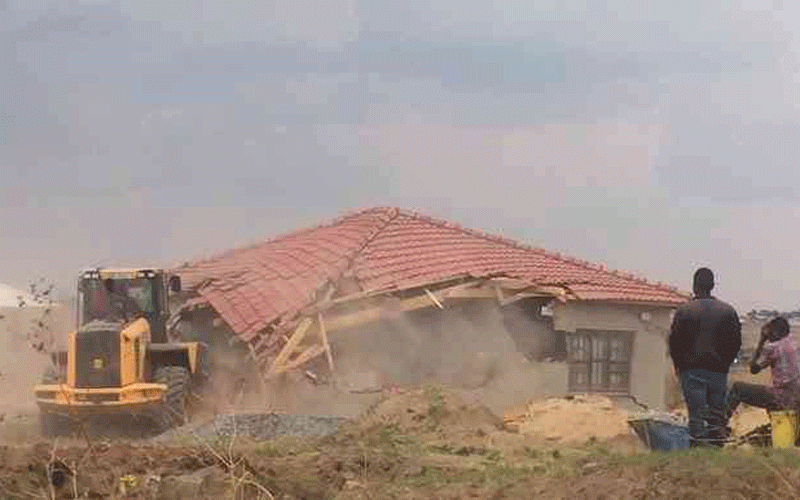
It has been over two months since veteran arts administrator Nicholas Moyo was elevated to the apex of the National Arts Council of Zimbabwe (NACZ) as its director and the journey has not been a stroll in the park.
The style interview by Kennedy Nyavaya

Moyo has conducted whirlwind tours across the country’s provinces engaging stakeholders amid doubts over his capacity to transform the struggling creative sector despite his experience as deputy director for several years.
He has, however, outlined his vision to transform the waning arts sector into a fully functional industry.
The Standard Style reporter Kennedy Nyavaya (KN) caught up with Moyo (NM), who, in a wide-ranging interview, gave a detailed account of his journey as a fine artiste, playwright, poet and theatre performer right up until he entered arts administration. Below are excerpts from the interview.
KN: You have quite an illustrious background in the arts, but it appears you are having challanges as NACZ director, is this what you expected when you took up the post?
NM: I think it’s more than I had bargained for, but after my trips accross the country consulting the stakeholders, I am richer in knowledge and I am more clear on the expectations. One key thing that was very clear from stakeholders outside is that Zimbabwe is not Harare and that is the major disease that most of us suffer for, which is why the president [Emmerson Mnangagwa] is talking of devolution. It’s a recognition that if you don’t [devolve], you will forever be accused of being a Harare arts council or government that only supports things that happen in Harare. When you go out there, you discover that there is so much happening and the needs are different and unique yet when you sit here and plan strategy at times you plan strategies that are just sweeping across assuming that what you see in Harare as challenges that artistes are facing are challenges throughout the country. Another key thing that I learnt is that people cannot match their expectations to the organisation that they are laying a claim to. When you get out there you discover that many artistes assume that certain things that are not even done by the arts council is what the arts council is supposed to do. so at times when we get criticised we are criticised by people who also have no clue of what our mandate is. So, it was eye-opening for me to go around the country and I am currently drafting a report, which we will be sharing with the board and management as well as the public.
KN: According to your vision for the arts, how are you going to decentralise activities of the NACZ?
- Chamisa under fire over US$120K donation
- Mavhunga puts DeMbare into Chibuku quarterfinals
- Pension funds bet on Cabora Bassa oilfields
- Councils defy govt fire tender directive
Keep Reading
NM: First, understand that NACZ has offices in the provinces, but they are poorly manned currently. in our structures there are supposed to be five people at every office, but at the moment we have two and in some cases one and it is because of the inability to employ as a result of the costs. However, my plan is to find ways of engaging. The bulk of the work we should be doing is coordinating because we are not the actors ourselves. so we have to create sustainable structures at lower levels that will be used to achieve our goals. We need to work with stakeholders. currently we are in the ministry of youth, sports, arts and recreation and the major component for me is the department of youth, which already has youth offices up to district level, so I may not need arts officers up to district level. Lots of our arts are in the hands of the young, so how do we ensure that other government departments are synergised to ensure that we use the networks that are already there? The other one is the Sports and Recreation Commission because sports is in our ministry and has facilities, so how do we work in the same ministry and make sure that these facilities like sports centres can be spaces for arts exhibition and so on? it could be a lot cheaper for government to make use of what it already has.
KN: The issue of funding is one of the hot topics in the sector and you have set up an internal resource mobilisation initiative to generate funds of late. Tell us how you hope to navigate the crisis and make funding available for artistes considering that government is struggling in that regard.
NM: The government of Zimbabwe is constrained financially and everybody knows that. It does not mean the government is broke, it has some resources, that is why the second level for me is prioritisation. are we [as the arts sector] presenting a case strong enough for treasury to then allocate some resources for development of the creative sector? I still believe government can rise from the levels that they are supporting NACZ, so we need to present a business case that can help government make a decision. It [the fund mobilisation vehicle] collapsed in 2009 because the economy had been what it was, that is why we are resuscitating it. When government increases the operational fund for NACZ, it then releases the fundraising efforts of NACZ because if the same fund caters for administration it will not achieve its purpose.
KN: You recently had a meeting with the Minister of Youth, Sport, Arts and Recreation, are you at liberty to disclose the outcomes of that meeting?
NM: No. Remember the minister has not yet made public statements about her vision for the arts. It is important that I leave that room so that when the minister has announced her direction, we plug in and move. I think in due course she will. however, you are correct there is already a call for a budget from the ministry so we are bidding, engaging the ministry because NACZ is an agency of government.
KN: In the lobbying that you are doing for funds, does the rhetoric that comes from the artistes, in the manner that it does, help you or it creates obstacles for you when you engage government?
NM: I think our government is very objective and it may not be swayed by negative or positive [criticism], but it does listen and the president has gone out and said he is ready to listen. We are confident our government is a listening government, but the issue we should address is how organised are we as the creative sector for it to make inroads in its engagement with government? The creative sector has been fragmented and we are hopeful that with the passage of time, the sector sees the importance of having one organised voice because government listens to organised groupings.
KN: There has been a push to remove you from your current post by some sections of civic society who claim that you did not make it on merit and would hinder growth. what is your take?
NM: We have only come across one organisation, which is called Nhimbe Trust, it’s nonsense. People are asking who they are, they are a civil organisation and they are there to put government on their toes so they are doing what they are paid for by donors, to make noise. It’s not substantiated. So, for me it’s wasting time addressing people that are barking because they are supposed to. If they don’t, how will they survive? Remember they are not arts associations or guilds that converge there and for government to listen to one person, it is not possible.
KN: You have a wealth of knowledge in administration coming from an era where arts once flourished locally and you have said you want to enable improvement of the arts. What would be your advice to the current generation of artistes?
NM: The sector needs to find itself. the reason why you hear artistes say I do not need to be part of something concerning arts tells you the level of ignorance. People do not become part of something because they are afraid of power, unity and they think they are enough alone. that is why I am saying it is ignorance because you are never powerful alone. So, the sector needs to talk more within itself and create more platforms of engagement. If you do not bring people together, some will say we want money to buy tools while others request actual resources to use and make money, so they are not able to see things in the same light.
KN: What would it take for the local creative business to be transformed from being a sector into a viable industry?
NM: We need to transform this sector to be an economic player in Zimbabwe for it to be considered an industry. An industry that has a well-defined value chain because we need to know who are the creators, producers, distributors and markets. so unless this is defined we remain with people that are operating at three levels in one doing everything alone. You cannot run an industry like that, so there are certain fundamentals you need to address and that is one of my tasks to make sure that we move with everyone and ensure that every player enters into a proper industry. When we are now an industry we can do proper research as to the contribution of the industry to the GDP where there is no guesswork. We want the creative industry to be recognised and not placed under others and when that happens, we will not ask for money from treasury because they will know it is a lucrative industry to invest in.
KN: There has been so much talk around the National Arts Merit Awards (Nama), which are said to have lost their glamour as a result of perceived inconsistencies and controversy, is there going to be a change?
NM: Firstly, I do not agree, Nama has not lost its status, but it has actually gained it. I am yet to see an artiste that complains and does not enter their work the following year.
KN: But, is that not because they are the only big awards that are there?
NM: If it has lost its status then why be part of it? That is why I am saying it is actually not true. Secondly, the number of entries continuously increases to show that everyone wants to be associated with it. If Nama was useless anyone who loses should just go ahead, rubbish and keep quiet, but the reason why people are talking is because Nama has value. However, it does not mean it does not have shortcomings. We want to rebrand it although it may not be this coming year because it is an institution and it will be unfair for me to promise a lot for people to say we are waiting for better things because my predecessor has left. There are certain things that have been good and we want to consolidate and lift them high. but there are other things we are getting from people and we are saying when we change leadership, it is an opportunity to change certain things. Nama will definitely, be rebranding. By the way, we will also have a new events manager and when that happens, he comes with a different way of presentation. Lastly, Nama is under pressure because it is the only award giving institution in the country, that’s our sin. If we want to relieve this pressure on Nama, we need to have sectoral awards and that is my focus in the coming three years.
KN: As we are talking, you have raised a number of set goals you intend to achieve. is there a timeline to all these so that you can be made to account?
NM: I have been given five years on this job, I am not here forever. If I do not perform in five years, I go to the farm so as for the time frame, technically things should happen in the first three years and we are saying people should start seeing that we are moving towards a new dispensation and then the other two years will be merely consolidating and planning for the future. Let me also underline and say it is not about Nicholas Moyo, things I am talking about are about the legacy we can leave for our children and their children. It’s about making a change. We have vision 2030 as a nation and it is about finding out how the creative industries can dovetail into the national scope and these are the questions because if we work parallel, we cannot tap into the government’s plans. We need to define this industry.
KN: Lastly, there have been complaints by some sections that the bulk of NACZ’s work is merely regulation and taxing, especially promoters. what is your take on that?
NM: No serious promoter has ever complained, people who are complaining are fly-by-nights and that is the problem with being a sector. An industry has rules of entry and exit, but we have a sector where anyone can just enter, do whatever they want and exit —should we allow that? No. It is only in our sector where people do not want rules and they enter because they have seen money. We are saying, let’s create order and when there are problems the sector should cushion you, so it’s not about regulation it is about who wants to be a player following rules.











